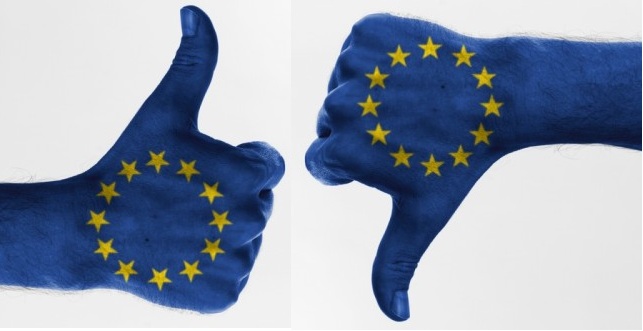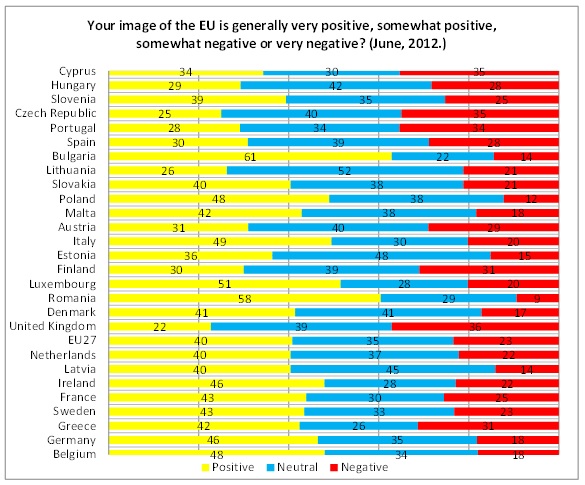In 2013, Republikon Institute carried out a project funded by the Friedrich Neumann Foundation, called Intensifying Euroscepticism in East Central Europe. The main motivation of the project was the recognition that whereas in some areas a market-oriented, almost “liberal” euroscepticism is born, in some other countries, most notably in Hungary, euro-scepticism is a nationalist tool of the right-wing government to antagonise Hungarians, turn them more inward, and reach out to far-right, radical voters. Our project attempted to classify the different types of euroscepticism and formulate a strategy for dealing with them – analytically as well as in the public debate.
|
Greatly/somewhat bound to Europe |
The country’s EU membership is a good thing |
The country benefited from the EU membership |
|
|
EU-27 |
73.7% |
56.5% |
53.2% |
|
Hungary |
87.2% |
36.4% |
32.3% |
1. table: Attitude towards the EU in EU countries and in Hungary
The reasons for euroscepticism are diverse; they can’t be described by only one aspect of politics. First of all, we must state that criticism changes from nation to nation, according to the member states’ historical, cultural or social development. For instance, while the central criticism of the EU integration in the UK is the violation of national sovereignty, critics in Italy believe in deepening the integration to overcome current dysfunctions. Still, besides national differences, a pattern can be recognized among member states with similar characteristics. Generally British, Western- and Eastern-European identities are hardly compatible with the universal “European” identity, but there are other differences too. Northern countries criticize the EU for not being able to control the policies of southern countries, and at the same time Mediterranean parties blame the Union for forcing its policies on them. Generally speaking, euroscepticism involves economic, political and cultural criticism.
Research by a Hungarian institute identified four groups of critics, such as voters seeing EU as abandoning national sovereignty, the ones disappointed by the failed economic development, the ones that do not understand how institutions work, and the ones disappointed by the recession. Another theory deals with “hard” and “soft” skepticism; the former rejecting the Union by principle, and the latter dissatisfied only with the institutional system. An example of the former is UKIP, but it does not stand alone; while the Slovenian or Estonian criticism presents the latter, defending their countries´ economic development. Some experts differentiate between scepticism against the principle of the integration, and its benefits in practice. Many factors distort the general perception of the EU – opinions about the EU might change along with opinions of the current government (e.g. in Hungary) and less informed communities are more easily deluded.
According to the research, the reasons for scepticism can be divided into three main categories. Democratic deficit relates to the problem that decisions are not made by elected government, but by unknown institutions. It is connected with the violation of national sovereignty, and the widening of the EU’s reach. The third category could be described as uncertainty. It consists of many things – not knowing how the Union works, the sluggish flow of information (and its use by party-politics) or the uncertain reactions to the economic and fiscal problems of today.

These reasons have many easily recognizable political consequences. One is a gradual strengthening of radical, mostly far-right parties. A direct consequence of the 2008 economic crisis was the surprising result of the 2009 EP-election when Hungarian, Italian, French, Austrian, British and other radicals gained a lot of seats in the EP. Another one is the disinterest in European politics, recognizable in the slowly reducing participation in the EP-elections. Scepticism walks hand in hand with attitudes destructive to European solidarity. Populist, anti-elitist, nationalist ideologies strengthen the scepticism and weaken the values of integration, democracy or liberal civil rights, which is especially dangerous in the “young” democracies of Central and Eastern European countries.
Because of the different reasons, it is impossible to find a universal solution, but there are partial solutions such as creating a real European government or public sector. If it consisted of truly European parties, democratic sentiment would deepen, since many citizens now do not feel that they have any influence on European politics. More cooperation between the EU and member states in policy questions would lower the rate of distrust, and the citizens should be informed about all this directly.
The realization of the project – two workshops and a conference, held with well-known Hungarian and international public and political figures – helped the deeper understanding of euroscepticism, theoretical and practical, and to reach the aforementioned conclusions. It is complete with a research paper dealing with the phenomenon in detail, which is prepared within the project as well.




















No comments
Be the first one to leave a comment.